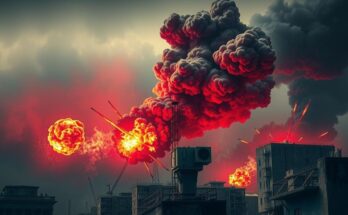The Weiser Diplomacy Center hosted Qutaiba Idlbi and Dr. Abdalmajid Katranji to discuss Syria’s reconstruction post-civil war. The talk highlighted the devastation from the civil war, the establishment of local governance, and the urgent need for the U.S. to reassess its sanctions policy. Students expressed appreciation for engaging with Syrian voices, emphasizing the importance of accurate information about the crisis.
On Thursday afternoon, the Weiser Diplomacy Center at the University of Michigan invited Qutaiba Idlbi, a senior fellow with the Atlantic Council, and Dr. Abdalmajid Katranji, an adjunct faculty member at Michigan State University, for a discussion on Syria’s reconstruction post-civil war. The conversation delved into the aftermath of the conflict, the current governance strategies in Syria, and the ongoing challenges faced in the reconstruction process.
The Syrian civil war saw the collapse of Bashar al-Assad’s regime on December 8, 2024, after prolonged stalemate. Ahmed al-Sharaa, also known as Abu Mohammed al-Julani, took leadership amidst the chaos, previously known as the leader of Hay’at Tahrir al-Sham based in Idlib.
In his remarks, Idlbi emphasized the extensive devastation from the war and its impact on human capital, particularly the loss of educated individuals. He cited significant displacement, stating, “There’s a lot for Syrians to rebuild; half of Syria has left the country,” indicating a profound brain drain not seen since World War II.
Despite the war’s destruction, Idlbi noted a sense of joy among Syrians for their newfound freedom from Assad’s authoritarian rule, saying, “You can feel the hunger or see the hunger on people’s faces, but you can also see the smiles and the joy on their faces that they are finally free.”
While Sharaa has been criticized in the West for alleged links to Al-Qaeda, Katranji and Idlbi contended that he has severed ties with the organization and currently combats both Al-Qaeda and ISIS. Katranji shared his experiences providing humanitarian aid in Idlib, highlighting the establishment of local institutions that support reconstruction efforts. He asserted, “There was structure, there was institutions and that’s what’s critical to understand.”
In stark contrast, Katranji described the chaos in areas controlled by Assad’s regime post-earthquake, where organizational structures were lacking. He noted that the lack of civil infrastructure severely hampered rescue efforts, requiring bribery for basic operations, thereby underscoring governance deficiencies.
Idlbi took the opportunity to draw a comparison between the Syrian situation and the U.S. intervention in Iraq. He suggested that, unlike Iraqis who were denied a chance to build post-Ba’ath rule, Syrians had created self-governing institutions amidst the conflict. “Syrians already know what they want to build,” he remarked, emphasizing local agency in reconstruction.
Idlbi expressed hope for a constructive role of the U.S. in Syrian reconstruction, stating, “I do believe in a good American role across the world,” while advocating for respect for Syrian autonomy in the rebuilding process. Furthermore, Katranji criticized the continued U.S. sanctions imposed on Syria via the Caesar Act, arguing for their removal to prevent further vacuum, stating, “If you wait too long, then another vacuum will be created, somebody else will step in.”
Katranji reiterated the urgency for advocacy regarding sanctions, indicating that broad international opinion is veering towards relaxation, as seen with positions from the EU and UN.
Student attendees expressed appreciation for the discussion, emphasizing the importance of direct engagement with Syrian voices. Razaan Killawi, co-president of Students Organize for Syria, encouraged greater student involvement and informed engagement regarding the Syrian crisis, stating, “I think it’s really meaningful when (students) can come to events led by Syrians…to learn from them and see what is actually happening.”
Overall, the event underscored the complexities and hopes surrounding Syria’s path to reconstruction post-civil war, highlighting the resilient spirit of the Syrian people and the critical role of international support in rebuilding efforts.
The discussion at the Weiser Diplomacy Center highlighted the enduring impact of the Syrian civil war and the ongoing reconstruction efforts as the country transitions to a new leadership under Ahmed al-Sharaa. Experts emphasized the importance of fostering local governance and institutions, contrasting with past interventions. The conversation also underscored the necessity for the U.S. to support Syria’s rebuilding without imposing external directives. The engagement from students indicates a growing interest in understanding the real-time developments within Syria, fostering a more informed community.
Original Source: www.michigandaily.com




